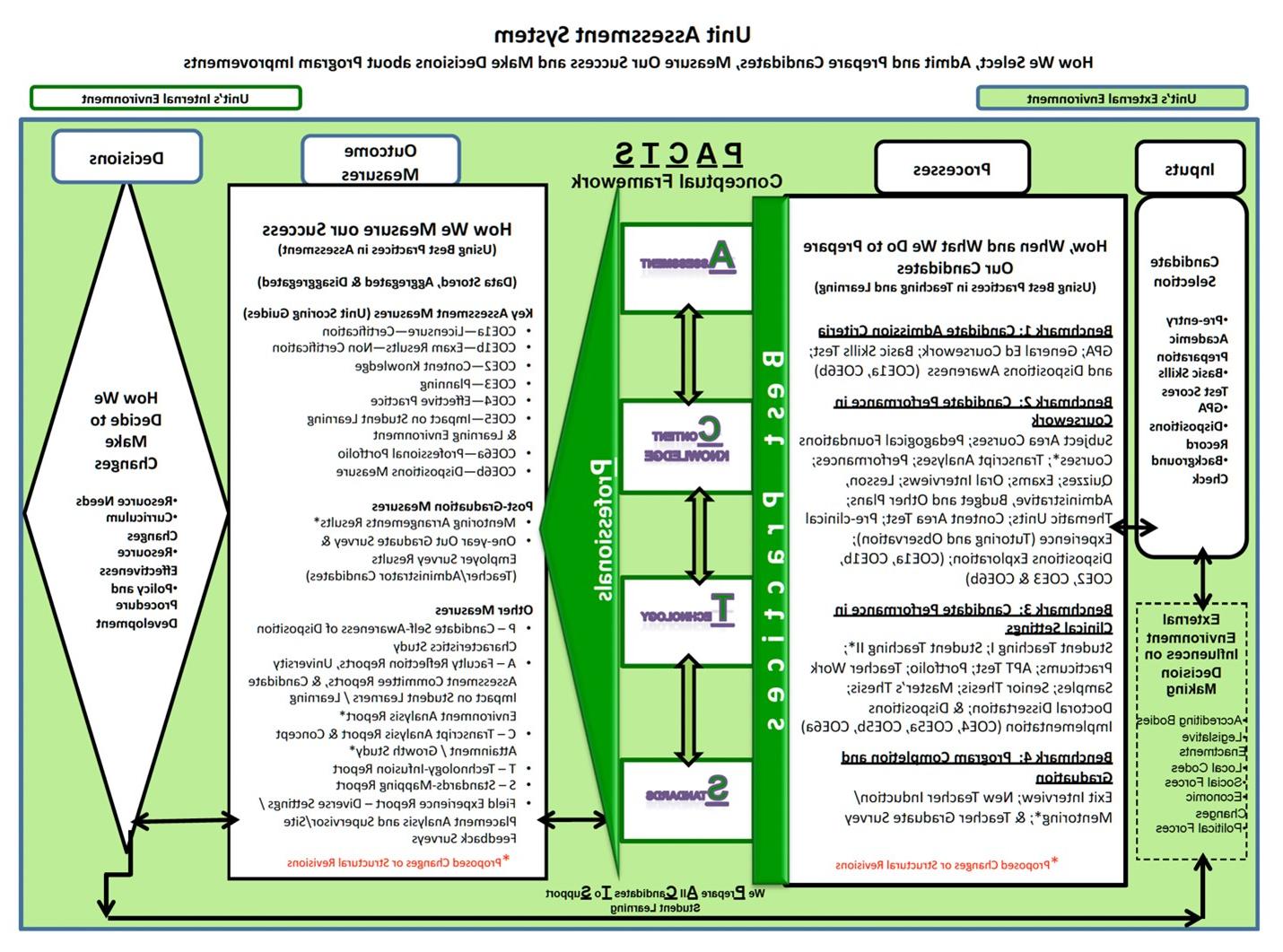评估
College of 教育
Conceptual Framework
的 COE Conceptual Framework stipulates the shared vision, mission, philosophy, purpose, goals, and standards for preparing educators to work in P-12 schools. 它沟通 the knowledge bases, including theories, research, and the wisdom of practice. 五个 critical themes synthesize our conceptual framework to express what we do on a daily basis to prepare our candidates:
(P) Professionalism
(一)评估
(C) Content knowledge
(T)技术
(S)标准
的se themes, which are represented by the 协定 acronym, express how our teacher preparation programs and other personnel preparation programs prepare our candidates to support students learning.
的 College of 教育 is committed to the principle that we:
- 开发 knowledge, skills and dispositions that characterize (P)rofessional school personnel;
- (A)ssess our candidates' competencies and prepare them to assess the abilities of students;
- 开发 (C)ontent and pedagogical knowledge among our candidates;
- 模拟使用 (T)echnology as tools that prepare candidates to effectively and efficiently facilitate 学习;
- 坚持 (S)tandards when designing and redesigning programs to insure best practices inside and outside the classroom.
的 协定 acronym also serves an added purpose of offering five alphabetic indicators for the College's motto: We Prepare All Candidates To Support student learning. 我们的教师 and staff employ best practices in teaching, learning, and assessment to ensure that our candidates are prepared to support student learning.
Key 评估 System
的 COE Key 评估 System is designed to consider the stages of Input / Processes
/ Outcome Measures and Decisions that are then used to continually improve candidate
performance over time. As shown in the diagram below, the College acknowledges the
influence of both internal and external factors that shape our practices. 一般来说,
we have identified four key benchmarks through which our candidates are transformed:
- 入学
- Candidate Performance in Coursework
- Candidate Performance in Clinical Settings
- Program Completion / Graduation
COE 教师 transform candidates through learning experiences aligned with our 协定 conceptual framework. 的n, we as a College at the course level, program level and College level, review our Outcome Measures that include our COE Key 评估s, COE Post-Program Completion / Graduation Measures and other Program or College level measures needed to assure that our candidates meet the expectations by the Illinois State Board of 教育 or other outside Approval Entity. Intentionally, program level assessment coordinators are then able to use our College and Program-specific key assessment instruments and other measures to report to the University through the University 评估 Committee process.

Key 评估 Scoring 指南s
的 College of 教育 Key 评估 Scoring 指南s align with the Danielson Framework,
the Candidate Preservice 评估 Student Teaching (CPAST) and 教育 Teacher
Performance 评估 (edTPA) key objectives for the student teaching / clinical learning experiences.
的 scoring guides developed for use with foundations courses, methods courses and pre-clinical learning experiences include:
- COE 2A - Content Knowledge and Skills - Scoring 指南
- COE 2B - Content - Technology - Scoring 指南
- COE 3 - Lesson / Unit Planning (DF Domain 1) - Scoring 指南
- COE 4 - Classroom Environment / Impact on Student Learning (DF Domain 2) - Scoring 指南
- COE 5 - Effective Practice / Instruction (DF Domain 3) - Scoring 指南
- COE 6 - Professionalism / Dispositions / Reflective Practice (DF Domain 4) - Scoring 指南
的 scoring guides developed for use with Methods courses, Field Practicum Courses and Student Teaching / clinical learning experiences include:
- COE Form B-1: COE Pre-Clinical Experience | Field Lessons | Mock Lessons in Methods Course - Scoring 指南
- COE Form B-2: COE Student Teaching Scoring 指南
- COE Form B-3: COE Candidate Work Sample - Scoring 指南
Descriptions and Scoring 指南s for the COE Key 评估s are available in the COE 评估 Coordinator Report.
Key 评估 Data Reports
- COE 评估 Coordinator Report - AY 2022
- Illinois State Board of 教育 (ISBE) Illinois Educator Preparation Profile for Chicago State University

 All Rights Reserved
All Rights Reserved